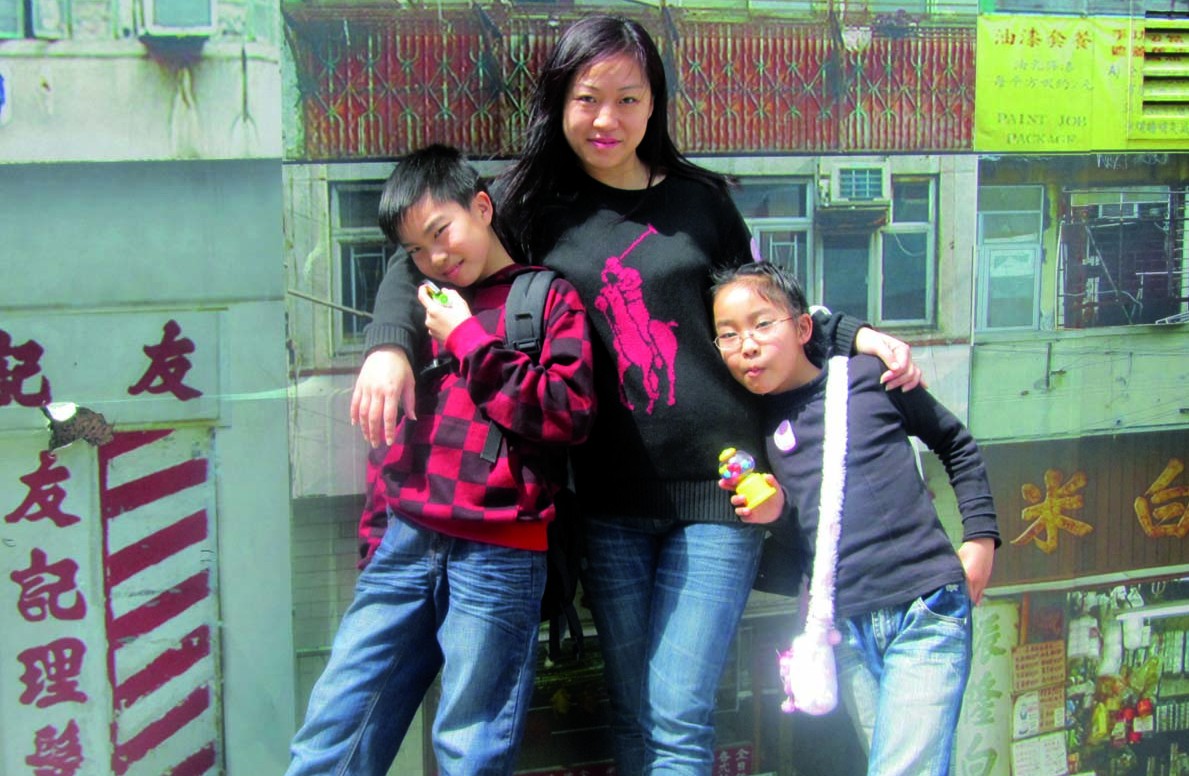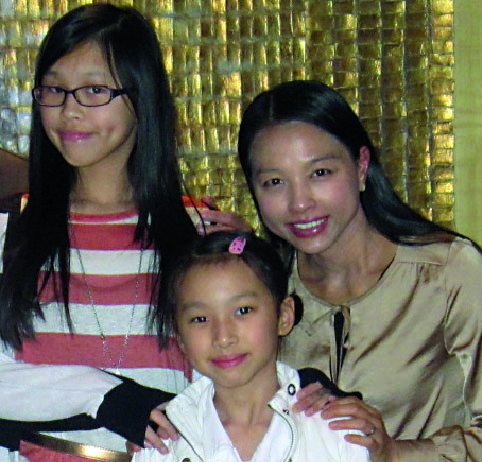
The Cantonese speakers who want English as their kids’ mother tongue
Reporters: Kris Lee and Yannie Mak
On a typical Saturday morning, the children’s section of Kowloon Central Library is packed with children and parents huddled around low tables and squashed into soft easy-chairs. The room is filled with the sound of parents reading aloud to their children in English, with varying degrees of fluency.
This is just one way Hong Kong’s parents are trying to make sure their children master English, which has been an official language of Hong Kong since 1842.
Since the handover, the use of Putonghua has joined English and Cantonese as an official language. Its use has become more important and more widespread. Government policy, implemented in 1998, saw the majority of Hong Kong schools switch from teaching in English to teaching in Cantonese.
Some feared English standards would fall as a result and a survey carried out by the Hong Kong Chamber of Commerce in 2007 suggested that 65 per cent of employers polled said they found employees’ English levels to be below international standards.
But as the keen competition for places at schools that teach in English and the government’s 2008 U-turn to give schools more flexibility to teach in English shows, parents and educators never doubted that English remains as important in Hong Kong today as ever.
For some parents, that means providing an exclusively English-language environment for their children, even though they are native Cantonese speakers in a city where Cantonese is the mother tongue for 97 per cent of the population.

Joey Wong Mei-kuen, a mother of two daughters, says: “The standard of English [of the younger generation] is worse than my generation.”
She attributes this to the lack of opportunities to practice the language since it is a second language in the community. Therefore, she chooses to use English to communicate with her children and has done so since they were born.
“We [parents] speak English at home [to our kids] to create the appropriate environment for a second language,” says Wong, who is a former kindergarten teacher. Her daughters are now studying in Primary Five and Form Two respectively at Sha Tin College, an English Schools Foundation school. Wong says she had planned to enroll them in the school even before they were born.
Wong says her husband went to university in Canada but she has never studied abroad or used English on a daily basis. However, she says she has no difficulty in using English to communicate with her children.
“You can treat my daughters as if they are foreigners,” Wong says proudly. So confident is she of their English level.
Alice Hui has two primary school-aged children. Like Wong she also spoke to them exclusively in English from birth. However, this stopped when they entered kindergarten. Although Hui also grew up speaking Cantonese, she says she spoke English when she worked at a hotel.
Hui is also critical of the English skills of children nowadays. “The pronunciation of students is terrible,” she says contemptuously. “They mix all the L and N sounds when speaking English.”
Apart from communicating with her children solely in English before they went to kindergarten, she also made a huge effort to create an all-round English environment. She rented English DVDs and subscribed to English TV channels to provide a native-speaking English environment for her children.
She introduced them to foreign teen pop, such as offerings from Justin Bieber and Hanna Montana to get them interested in English and intentionally employed an English-speaking Filipina helper.
“Growing up in an English environment definitely builds up their confidence in speaking English,” Hui says.
Although Varsity did not have direct contact with the children, Hui spoke for them, saying that unlike other kids, they are willing to talk to foreigners. She says they regard using English, watching English TV and reading English books as a habit. “They do not feel forced by us [parents] in using English,” she adds.
Wong and Hui are proud of the efforts they have made for their children and they say what they have done is not unusual. As more parents opt to communicate with their children in their own second language, some have questioned whether the less-than-perfect English standards of some of these parents and helpers may negatively affect the English levels of their children.
Linguistic sociologist, Katherine Chen, an assistant professor in the School of English at Hong Kong University says this is not the case. Chen says human beings have the natural instinct and innate capacity to acquire a second language when they are given the language environment
“Research has shown that as long as the children are given the language environment of using that particular language, for example, English, they do not actually take over the non-native language errors of their parents,” Chen says.
Chen explains that children acquire language from their environment and parents are just one source of input. Once they start mixing with other children from the age of two or three, they start to learn and practise their language skills by interacting with their peers and teachers, plus any other available sources, such as TV and music.
“Think about children growing up in Hong Kong whose parents are speaking a home dialect such as Chiuchow, Hakka or Shanghainese. The parents are likely to have a strong non-native Cantonese accent; the children grow up speaking native local Cantonese nonetheless,” says Chen.
In other words, a language environment, even non-native, can be conducive to language development. Children do not necessarily adopt the non-native accent or language errors of the parents or other caregivers.
That said, Chen believes it is a shame if parents only expose a child to one language when they themselves can speak another. “It’s a pity that only one language is used in the home context,” says Chen. “The children are not given the opportunity to learn or use other languages when actually they have the resources. A child can safely acquire four languages.”
Virginia Yip, who chairs the Department of Linguistics at Chinese University of Hong Kong, says the golden period for learning languages is birth to three years, when children can learn a language effortlessly. After four to five, learning a new language will need some effort. This is why cultivating a multiple language environment in infancy is an effective and conducive means for developing multi-lingual skills.
Yip, who is also the director of the Childhood Bilingualism Research Centre at CUHK, believes in bi-literacy and tri-lingualism and says if children speak only English in the golden period, Cantonese will eventually become their second language.
In fact Alice Hui, who went to great lengths to create an early English-only environment, says her children were not fluent in Cantonese when they entered kindergarten and still have difficulties understanding some difficult Cantonese phrases and words.
Professor Yip believes parents should strive for a balance, as it is undesirable to use one language at the expense of the other. “There is absolutely no doubt that English as an international language is very important, but so are the other languages,” she says.
Yip says there are many cognitive advantages in providing a bilingual or even a multilingual environment for children, one of which is helping them to be more innovative and multidimensional problem-solvers.
When it comes to teaching English to children whose mother-tongue is Cantonese, Yip suggests native speakers may not be the best teachers.
She says teachers who are Chinese and have studied abroad, who are proficient in both Cantonese and English, make the best role models for students. Their bilingual ability and multicultural background can stimulate students to accept multicultural values and achieve multilingual skills. She suggests that incorporating local cultural factors into the second language may make teaching more interesting.
While local Chinese parents are making heroic efforts to educate their children in English, expatriate families living in Hong Kong are also taking advantage of Hong Kong’s unique linguistic environment by sending their children to Putonghua classes.
Parents of different ethnicities and cultures in this city recognize the demands for multilingual ability in the younger generation to make them more competitive in the future.
But there is more to multilingualism than a competitive edge in the job market. As linguistic sociologist Katherine Chen says, it is good for children to know more languages. “To me, a language is not just a language; it is not just for communication,” says Chen. “It is also a window into a whole culture with different values, thoughts and wisdom.”
* The print edition and earlier online version of this story stated that Sha Tin College is an International School. It is an ESF school, we apologise for our mistake











































This article states a fact that is at odds with other article of this magazine. The other article about Muslims in Hong Kong says there are about 250,000 muslims in Hong Kong, mostly from Indonesia but also from South Asia and other locations. I am sure those 250,000 muslims are not native-speakers of Cantonese. If Hong Kong has about 7m people then 250k is about 3.7% of the Hong Kong people; then you have to add the expatriate population working in the financial, legal and business sectors that come mainly from Europe, Australia and North America; finally, all the Hong Kong residents coming from non-Cantonese speaking parts Mainland China and the Sinosphere in general. I think 97% native-speakers of Cantonese for an alpha-world city as Hong Kong is quite high. I wonder where you got that number from?
Yes, this is increasingly true. The article states that Shatin College is an international school. Actually, it’s not; it’s an ESF school. And what’s not mentioned is that, while Chinese children at ESF and int’l schools do pick up English to native or near-native level, they do not learn any Chinese in school. Even if they have tutors for Chinese – very rarely can these children become fully literate in Chinese if they focus on English.
Thank you for your comment and for pointing out the error. We have corrected it.